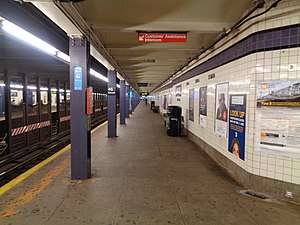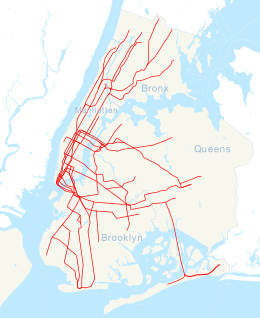46th Street station (IND Queens Boulevard Line)
46th Street is a local station on the IND Queens Boulevard Line of the New York City Subway. Located at the intersection of 46th Street and Broadway in Astoria, Queens, it is served by the M train on weekdays, the R train at all times except nights, and the E train at night.
46 Street | |||||||||||
|---|---|---|---|---|---|---|---|---|---|---|---|
 Eastbound platform | |||||||||||
| Station statistics | |||||||||||
| Address | 46th Street & Broadway Queens, NY 11103 | ||||||||||
| Borough | Queens | ||||||||||
| Locale | Astoria | ||||||||||
| Coordinates | 40.756685°N 73.914256°W | ||||||||||
| Division | B (IND) | ||||||||||
| Line | IND Queens Boulevard Line | ||||||||||
| Services | E M R | ||||||||||
| Transit connections | |||||||||||
| Structure | Underground | ||||||||||
| Platforms | 2 side platforms | ||||||||||
| Tracks | 2 | ||||||||||
| Other information | |||||||||||
| Opened | August 19, 1933 | ||||||||||
| Station code | 270[1] | ||||||||||
| Wireless service | |||||||||||
| Opposite-direction transfer available | No | ||||||||||
| Traffic | |||||||||||
| Passengers (2019) | 2,609,445[4] | ||||||||||
| Rank | 187 out of 424[4] | ||||||||||
| Station succession | |||||||||||
| Next east | Northern Boulevard: E | ||||||||||
| Next west | Steinway Street: E | ||||||||||
| |||||||||||
| |||||||||||
| |||||||||||
History
The Queens Boulevard Line was one of the first lines built by the city-owned Independent Subway System (IND),[5][6][7] and stretches between the IND Eighth Avenue Line in Manhattan and 179th Street and Hillside Avenue in Jamaica, Queens.[5][7][8] The Queens Boulevard Line was in part financed by a Public Works Administration (PWA) loan and grant of $25 million.[9] One of the proposed stations would have been located at 46th Street.
The first section of the line, west from Roosevelt Avenue to 50th Street, opened on August 19, 1933. E trains ran local to Hudson Terminal (today's World Trade Center) in Manhattan, while the GG (predecessor to current G service) ran as a shuttle service between Queens Plaza and Nassau Avenue on the IND Crosstown Line.[10][11][12][13][14][15]
Station layout
| G | Street level | Exit/entrance |
| P Platform level |
Side platform | |
| Southbound local | ← ← ← | |
| Northbound local | | |
| Side platform | ||
This underground station has two tracks and two side platforms. The express tracks on the IND Queens Boulevard Line, used by the E train during daytime hours and the F train at all times, run via a separate routing under Northern Boulevard.
Both platforms have a purple trim line on a black border and name tablets reading "46TH ST." in white sans serif lettering on a black background with a purple border. Beneath them are small directional and station signs (reading "46TH ST.") in white lettering on a black background. Purple I-beam columns run along both platforms at regular intervals with alternating ones having the standard black station name plate in white lettering.
Exits
Both platforms have one same-level fare control area at either ends and there are no crossovers or crossunders. The full-time side is at the west (railroad south) end of the Manhattan-bound platform. It has a turnstile bank, token booth, and one staircase to the northwest corner of 46th Street and Broadway. The fare control area on the same end of Forest Hills-bound platform has a part-time turnstile bank and token booth (with two High Entry-Exit Turnstiles providing access to and from the station at all times) and one staircase to the southwest corner of 46th Street and Broadway.[16]
The fare control area on the east (railroad north) end of the Manhattan-bound platform has a part-time turnstile bank and customer assistance booth (with two High Entry-Exit Turnstiles providing access to and from the station at all times) and one staircase going up to the north side of Newtown Road between Broadway and 48th Street. The fare control area on this end of the Forest Hills-bound platform is un-staffed, containing full height turnstiles and one staircase going up to the southeast corner of Broadway and 48th Street.[16]
There is evidence of a provisional fare control area at the center of both platforms, presumably leading to 47th Street. The Forest Hills-bound platform has a set of doors leading to an employee-only facility while the Manhattan-bound platform has a wide fenced off area. Stairs to the street were never constructed.[17]
References
- "Station Developers' Information". Metropolitan Transportation Authority. Retrieved June 13, 2017.
- "NYC Subway Wireless – Active Stations". Transit Wireless Wifi. Retrieved November 13, 2019.
- More Subway Stations in Manhattan, Bronx in Line to Get Online, mta.info (March 25, 2015). "The first two phases included stations in Midtown Manhattan and all underground stations in Queens with the exception of the 7 Main St terminal."
- "Facts and Figures: Annual Subway Ridership 2014–2019". Metropolitan Transportation Authority. 2020. Retrieved May 26, 2020.
- Duffus, R.L. (September 22, 1929). "OUR GREAT SUBWAY NETWORK SPREADS WIDER; New Plans of Board of Transportation Involve the Building of More Than One Hundred Miles of Additional Rapid Transit Routes for New York". The New York Times. Retrieved August 19, 2015.
- "QUEENS SUBWAY WORK AHEAD OF SCHEDULE: Completion Will Lead to Big Apartrnent Building, Says William C. Speers". The New York Times. April 7, 1929. Retrieved September 1, 2015.
- "Queens Lauded as Best Boro By Chamber Chief". Newspapers.com. Brooklyn Daily Eagle. September 23, 1929. p. 40. Retrieved October 4, 2015.
- "New Subway Routes in Hylan Program to Cost $186,046,000" (PDF). The New York Times. March 21, 1925. p. 1.
- "TEST TRAINS RUNNING IN QUEENS SUBWAY; Switch and Signal Equipment of New Independent Line Is Being Checked". The New York Times. December 20, 1936. ISSN 0362-4331. Retrieved April 26, 2016.
- Kramer, Frederick A. (1990). Building the Independent Subway. Quadrant Press. ISBN 978-0-915276-50-9.
- Raskin, Joseph B. (2013). The Routes Not Taken: A Trip Through New York City's Unbuilt Subway System. New York, New York: Fordham University Press. doi:10.5422/fordham/9780823253692.001.0001. ISBN 978-0-82325-369-2.
- "Independent Subway Services Beginning in 1932". thejoekorner.com. August 21, 2013. Retrieved August 2, 2015.
- "TWO SUBWAY UNITS OPEN AT MIDNIGHT; Links in City-Owned System in Queens and Brooklyn to Have 15 Stations" (PDF). The New York Times. August 18, 1933. Retrieved November 7, 2015.
- "New Queens Subway Service Will Be Launched Tonight; Tunnel From Manhattan Open to Jackson Heights; Service Will Eventually Be Extended Through To Jamaica". Long Island Daily Press. Fultonhistory.com. August 18, 1933. p. 20. Retrieved July 27, 2016.
- "New Queens Tube To Open Saturday: Brooklyn-Long Island City Link of City Line Also to Be Put in Operation". New York Evening Post. Fultonhistory.com. August 17, 1933. p. 18. Retrieved July 27, 2016.
- "MTA Neighborhood Maps: Astoria" (PDF). Metropolitan Transportation Authority. 2015. Retrieved September 27, 2015.
- https://web.archive.org/web/20150113014240/http://www.stationreporter.net/rtrain.htm
External links
| Wikimedia Commons has media related to 46th Street (IND Queens Boulevard Line). |
- nycsubway.org – IND Queens Boulevard Line: 46th Street
- Station Reporter — R Train
- Station Reporter — M Train
- The Subway Nut — 46th Street Pictures
- 46th Street entrance from Google Maps Street View
- 48th Street entrance from Google Maps Street View
- Newton Road entrance from Google Maps Street View
- Platforms from Google Maps Street View



%26groups%3D_d61de14d1874f4e1435b16bed595c8e6a20b56c7.svg)